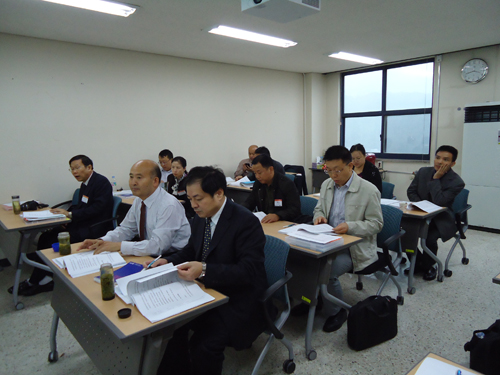17 September, 2012 --- The Seminar on “Capacity Building in Poverty Reduction” took place at the Sangmyung University in Seoul, South Korea. This training activity was sponsored by IPRCC, organized by the Korea-China Cultural Association (KCCA) and Sangmyung University, and supported by the United Nations Development Programme (UNDP) and China International Center for Economic and Technical Exchanges (CICETE). 17 officials responsible for international poverty reduction training from IPRCC, CICETE and 8 provincial poverty alleviation offices and autonomous regions took part in this activity.
Mr. Yong Sung Park, Vice President of Sangmyung University addressed the opening ceremony, and Deputy Party Committee Secretary of LGOP Xia Gengsheng also delivered a speech on behalf of the sponsor and all trainees.
Lasting for 15 days, the training activity aims to promote experience exchanging and knowledge sharing in international poverty reduction and development between China and South Korea, help Chinese poverty alleviation departments to get a better understanding of the latest achievements of international theoretical studies and policy analysis on poverty reduction, South Korea’s rural poverty reduction and development policies and implementation experience as well as further their studies on promoting capacity building in poverty reduction both at home and abroad.
The training activity covers three parts: special lectures, case studies and field trips. With regard to the first part, scholars and experts from South Korean Rural Economics Research Institute, Kookmin University, Rural Development Administration, National Academy of Food, National Academy of Agricultural Science, Keimyung University, Hankyong National University and other governmental departments and research institutions will give brief introductions to different topics such as South Korea’s political, economic and cultural conditions, its rural social security and relief system, the construction, operation and management of its farmers organizations, production models of food crops and cash crops, the operation and management of South Korea’s rural financial system, rural education development models and ecological protection policies and practices. Case studies will cover the models of how South Korea’s rural communities develop industries with local advantages, the operation models of rural community cooperative organizations and implementation models of social security policies. In addition, delegates will make a field trip to Daegu, Gyeongju and Busan to visit the country’s typical poverty reduction innovation program to obtain a thorough knowledge of rural social security and relief system, commercialization and higher yields led by distinctive crop cultivations, the role played by agricultural financial institutions in rural economic development. They will also have in-depth discussions with project-related personnel.
This training activity will deepen the knowledge sharing and experience exchanging between China and South Korea in the area of poverty reduction. It has offered a learning opportunity for officials from various levels of poverty alleviation departments, and promoted capacity building of poverty alleviation teams.

